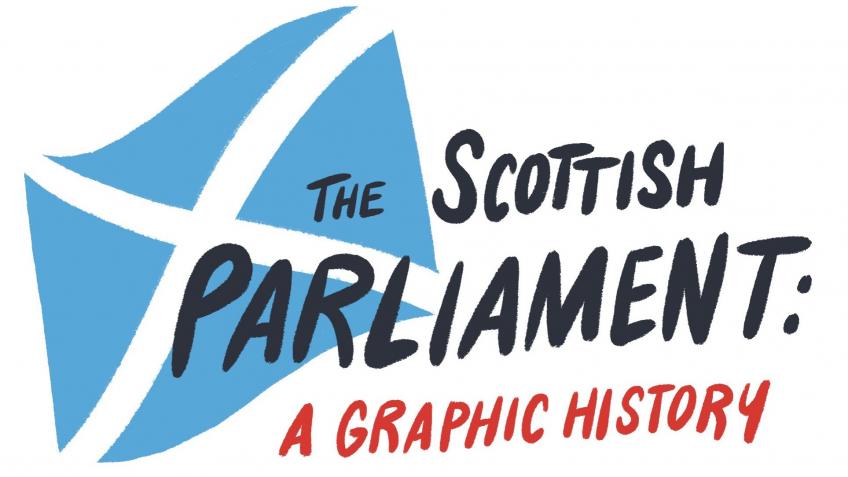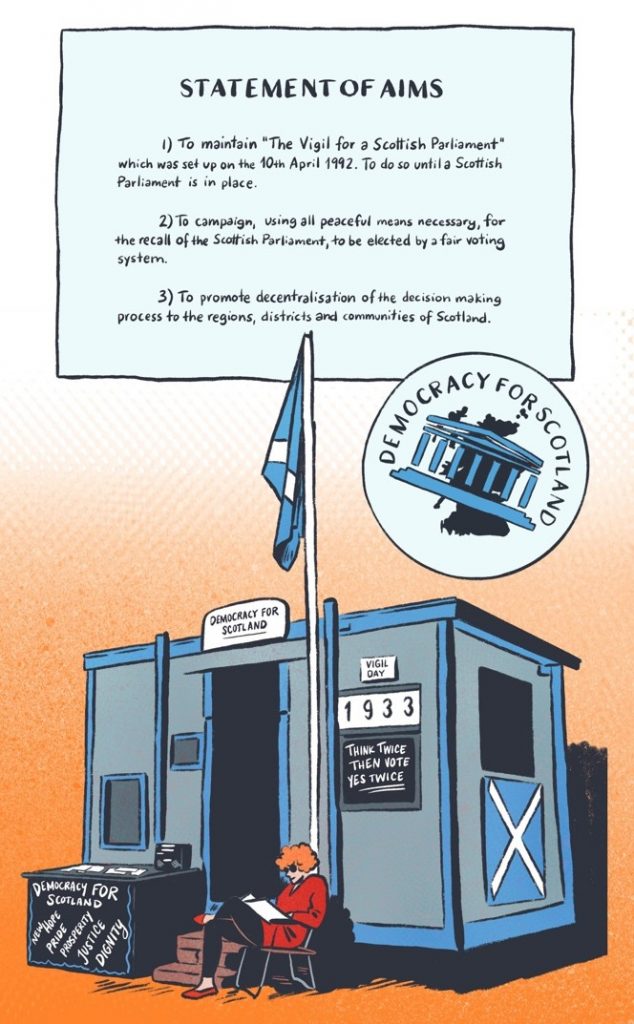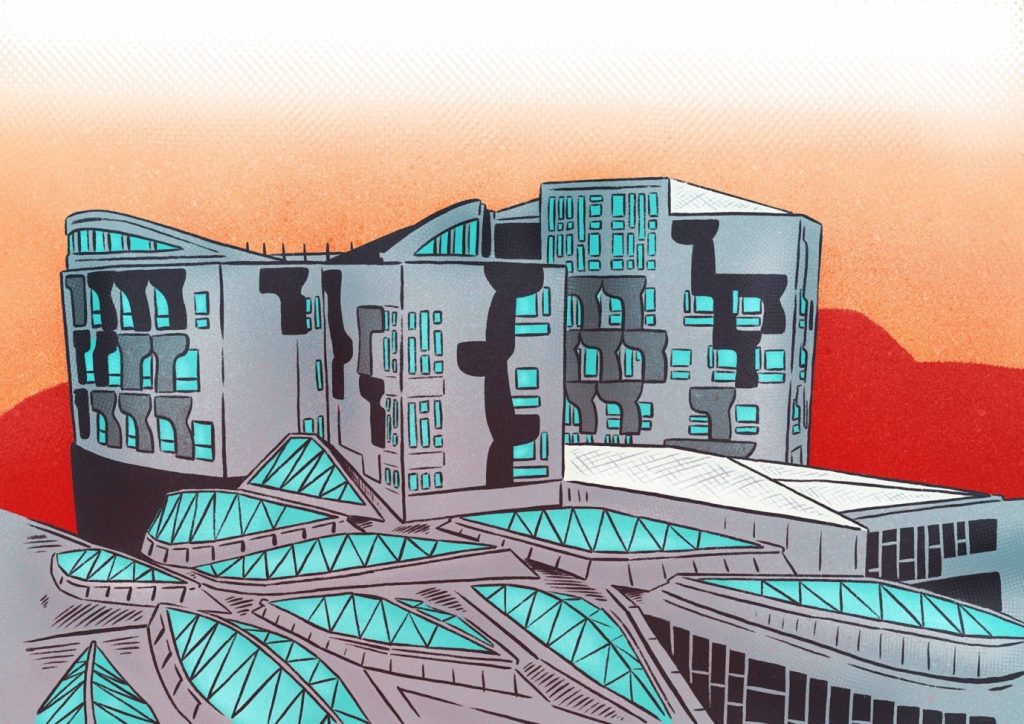Emily St.Denny, Lecturer in Politics, discusses a new initiative to mark the twentieth anniversary of the Scottish Parliament, through the creation of a new book: The Scottish Parliament: A Graphic History. Drawing on a unique collection of material from the University’s Scottish Political Archive, the book will provide a new resource to engage a wide range of audiences in the story surrounding the campaign for devolution in Scotland, the establishment of the Scottish Parliament, and its first twenty years of operation.

2019 is a significant anniversary year in Scottish politics. It marks forty years since the failed 1979 referendum on a Scottish Assembly, thirty years since the establishment of the Scottish Constitutional Convention to promote devolution in 1989, and twenty years since the devolved Scottish Parliament was finally established in 1999. Anniversaries such as this invite us to reflect on our past, on the paths we’ve taken, and on the progress we’ve made.
The University of Stirling’s Scottish Political Archive offers a unique insight into the story of devolution in Scotland, including first-hand accounts and campaign materials from those at the heart of Scotland’s constitutional debate. To mark the twentieth anniversary of devolution, researchers at the University are fundraising for and commissioning a new resource telling the story of the Parliament’s creation, through rich and vivid illustrations. Based exclusively on the Archive’s materials, The Scottish Parliament: A Graphic History will consider Scotland’s journey to devolution, from early campaigns through to the present. Copies of the book will be distributed to every high school and public library in Scotland, providing an original and engaging resource to help current and future generations understand this important chapter in the country’s history.

The ‘new’ Scottish Parliament: A maturing institution
In 1999, after an absence of three hundred years, the Scottish Parliament was reconvened. Drawing on the recommendations of a broad range of political and civil society actors, brought together under the umbrella of the Scottish Constitutional Convention, the Parliament was designed in such a way as to deliver a ‘new Scottish politics’. The idea, it was hoped, was that a proportionally elected chamber, a strong committee structure, and more collegial relation between parties would offer democratic renewal and more appropriate, ‘Scotland-specific’, policies than the ‘one-size-fits-all’ ones decided in Westminster.
Since then, the Parliament has been responsible for developing, deciding, and delivering laws across an ever-growing range of policy areas, from agriculture to welfare. These laws directly affect the lives of millions of people living in Scotland, all of whom have a stake in understanding how their representatives act on their behalf. But over the last twenty years, the Parliament and the people of Scotland have changed. Devolution, and the Scottish Parliament’s authority to make and shape policy across a range of sectors, is now a permanent, if not unchanging, fact of life. The powers at the Parliament’s disposal have grown, and the elected representatives who sit in the chamber have learned and shaped its rules. We are no longer in the presence of an institution in its infancy, whose every procedure needs to be invented, tested, and mastered.

The project
As researchers, we spend a lot of time writing dense and lengthy tomes for the benefit of our colleagues and students. But we also have a duty to open our research up to the public. Graphic art offers an aesthetic and engaging way for us to experiment with a new medium through which to bring to life our expertise and make it accessible to new audiences. The book will draw on the Scottish Political Archive’s extensive collection of documents and artefacts from the Campaign for a Scottish Assembly (and after) to bring to life Scotland’s contemporary political heritage. It will merge art and information, reproducing rare archive photographs and campaign materials while telling the story of how the Scottish Parliament was established.
The devolved Parliament is a dynamic institution. Over time, it has realised some, but by no means all, of the lofty aspirations associated with ‘new politics’. For example, MPSs passed some high profile policies that diverge with the rest of the UK, such as the ‘Baby box’ initiative intended to help improve child health. At the same time, however, there are still pervasive elements of ‘politics as usual’, like the fact that MSPs remain predominantly male, white, and middle-aged. This book will help readers as young as 12 and as old as 112 understand why some hopes people had for devolution have been achieved and not others. It will present an evidence-based account of how Scottish Parliamentary democracy works and how laws and policies are made in Scotland, introducing readers to the Parliament’s committee system, the day-to-day life of Members of the Scottish Parliament, and the mechanisms that citizens have at their disposal to influence their Parliament’s work. Featuring the voices of those who worked to reintroduce a Parliament in Scotland, as well as those who have worked within it, the book will also invite readers to reflect on the challenges and opportunities facing the Scottish Parliament going forward.
At a time when fraught but extremely important debates are being held over the place and role of Scotland in the UK, the EU, and the world, the 2019 anniversary year helpfully focuses our attention. It asks that we take stock and hold constructive conversations about what the role of the Scottish Parliament should be, whether and how it should be reformed, and who should get a say in the matter. ‘The Scottish Parliament: A Graphic History’ is an invitation to learn more and reflect on the past and future of democracy in Scotland.
The Scottish Parliament: A Graphic History project is being funded through a crowd-sourced campaign. More information can be found on the crowdfunder page.
